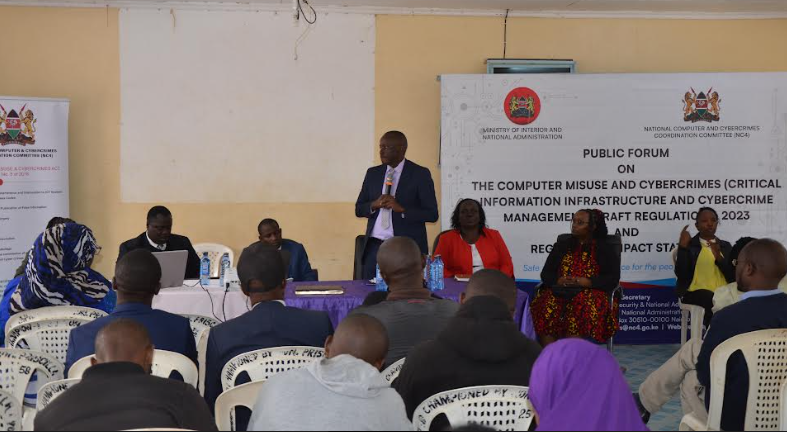Two local administrators are calling for the state to enact stringent measures to curb the rising number of reports of online bullying in the country.
The two, both victims of cybercrime, noted that the lack of binding laws has remained the weak link in the fight against individuals who prey on unsuspecting Kenyans and end up swindling them of their hard-earned cash.
The duo also called for more sensitization forums among the local populace through the offices of chiefs and their assistants, as the latter are in close proximity to the masses.
They were giving their submissions during a public participation forum on the proposed Computer Misuse and Cybercrimes (Critical Information Infrastructure and Cybercrime Management) Draft Regulations 2023.
“We have been having challenges with cybercrimes, and we do not know how to channel them. When we go to the police, it’s like they are also confused. Last week, my Facebook account was hacked and used to swindle money from unsuspecting Kenyans. It took some time to stop the process since the hackers kept on breaking into any new account I was opening,” submitted Mary Gitonga, who is Nyeri town chief.
She, however, called upon parents to be part of the war against cyberbullying by restricting their children from visiting unsafe sites where they may eventually end up falling victims to cyberbullies.
She warned that many young people are currently going through psychological torture silently, while others have ended up taking their lives after having undergone harrowing experiences at the hands of cyberbullies.
For Hadija Juma, who is the Chief for the Ruring’u location, the war against computer misuse and cybercrime can only be won if grassroots leaders are put at the centre of the matrix.
Ms. Juma, who almost found herself behind bars after being lured by land cons who ended up swindling money from a member of the public from her location, said it’s only when local leaders are aware of the threats posed by such online fraudsters that they can assist victims who come to them for assistance.
“I have heard many positive things that will lead us to ease cybercrime issues, and I am happy that National Government Administration Officers (NGAO) will be part of that team that will be fighting this vice because when something happens in the community, the first stop is the chief and assistant chief. So when all is said and done, the chief and the assistant chief will be sensitised, “she told the taskforce on computer misuse and cybercrimes (Critical Information Infrastructure and Cybercrime Management Draft Regulations, 2023 public participation forum).
John Kamande, an online writer, narrated the distressing experience they are sometimes forced to go through after working without pay for unscrupulous global digital marketing firms.
He said he has been forced to live from hand to mouth even after investing much of his time working for online companies, only to be shortchanged after the work has been done.
“We want something to be done to really tame rogue online marketers who only misuse us to advance their partisan commercials. As young people who want to earn a living through online work, it hurts when you work long hours and invest your time and energy in such firms only to come out of the deal empty handed,” he said.
However, Phylis Wandeto, who works as a caregiver at the Thunguma Children’s Home, said the remedy for addressing misuse of online social platforms lies in the hands of individual parents.
Wandeto attributed the current rot in the societal moral fabric to the tendency of parents to delegate their roles to teachers and religious leaders, a decision that ends up handing children a free hand to explore the world through online digital platforms such as Facebook, WhatsApp, snapchats, and TikTok.
“We cannot address the issue of cybercrime unless we as parents take up our responsibilities to educate our children on the dangers of emerging online social media platforms. Parents need to bring up their children just the way they were brought up. We cannot delegate the responsibility of bringing up children to teachers, priests, and pastors and expect them to train them to become responsible adults in the future,” she pointed out.
On his part, Timothy Were, who is the chair of the taskforce, said there is a need for new regulations to help secure the country against potential threats from cyberattacks.
He pointed out that Kenya, being one of Africa’s fastest-growing economies in terms of e-commerce, needs to put up stringent measures that will also ensure there are legal mechanisms to punish both local and international hackers.
“The country is much more digitised. More and more sectors are being digitized. But we still have active attacks. We have suffered attacks in the past, so we must prepare. We must make our systems resilient, and we must have laws that punish those who attack or try to hack systems,” he told the press on the sidelines of the forum.
“As to how soon we will have the law in place, this will be determined by Parliament. After the countrywide public participation sessions, we will take the views to Parliament, where they will be able to debate them, and once they pass them, they will be accented by the President,” he added.
The new draft regulations have been developed pursuant to Section 70 of the Computer Misuse and Cybercrimes Act (CMA) 2018.
Some of the provisions of the Act relate to computer systems as enablers for timely and effective detection, prohibition, prevention, response, investigation, and prosecution of computer cybercrimes.
The act also establishes the National Computer and Cybercrime Coordination Committee (NC4).
The purpose of the new draft is, among other things, to provide a framework to monitor, detect, and deflect cybersecurity threats in the country.
In addition, it intends to provide a framework for the establishment and management of Critical Information Infrastructure (CII) and also make provision for recovery plans in the event of a disaster, breach, or loss of national information infrastructure.
According to the United Nations International Children’s Emergency Fund, skipping school is one common effect of cyberbullying that can affect the mental health of children who turn to substances like alcohol and drugs or violent behaviours to deal with their psychological and physical pain.
The aftermath of cyberbullying on mental health can vary depending on the medium through which it happens, with bullying via text messaging or through pictures or videos on social media platforms being cited as very harmful for youngsters.
By Samuel Maina and Wangari Mwangi




